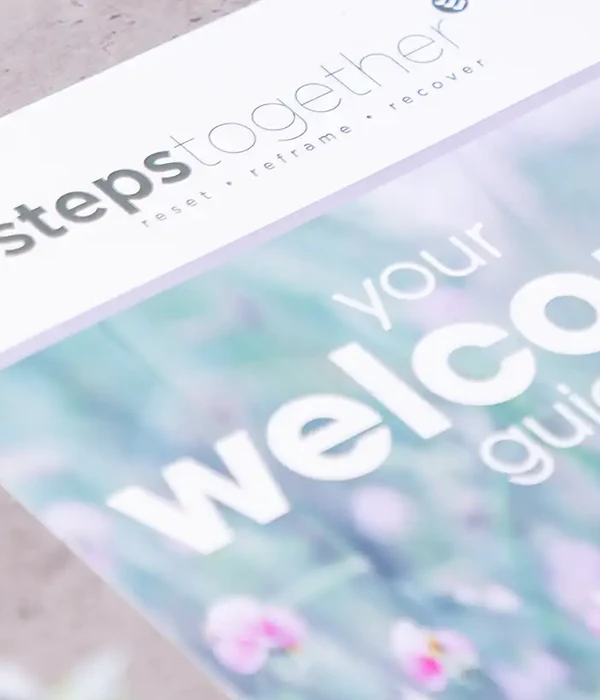Meth Addiction Treatment
Meth addiction may not be widespread in the UK, but it still affects vulnerable groups, particularly in certain social and nightlife settings. The drug can cause severe physical, psychological, and emotional harm, making effective treatment essential.
Recovery often includes a supervised detox, therapy, and aftercare. For those with co-occurring conditions like anxiety or depression, dual diagnosis treatment is vital to address both issues together and support long-term recovery.

Take the First Step Towards Recovery
Steps Together offers personalised support and proven treatments, providing the care, guidance and encouragement you need to move forward with confidence and build a healthier future.

Understanding Methamphetamine Addiction
Methamphetamine is a powerful stimulant that can alter your brain chemistry, change your behaviour, and lead to serious health problems. Meth addiction can happen quickly and is often linked to both physical and mental symptoms that may affect your daily life.
Meth usually comes in a white or clear crystal-like form, hence the street name crystal meth, and is swallowed, snorted, smoked, or injected. When you use meth, it causes a spike in dopamine, a brain chemical linked to pleasure, alertness, and body movement. This can create intense feelings of euphoria and energy. These effects are much stronger and longer-lasting than other stimulants, making meth highly addictive.
Causes and Risk Factors for Meth Addiction
Meth addiction can develop for many reasons. Genetics may play a part if close relatives have a history of substance use disorders. Personal circumstances, such as trauma or untreated mental health conditions, can increase your risk of addiction.
Easy access to meth, peer pressure, and living in areas where meth use is common also raise the chances of developing an addiction. Some people try meth to manage stress, depression, or anxiety, while others want to boost performance or lose weight.


Signs and Symptoms of Meth Abuse
Recognising the signs of struggling with meth addiction is important for getting help early. Physical signs often include rapid weight loss, tooth decay, skin sores, and frequent nosebleeds if the drug is snorted. You may notice extreme energy, constant talking, and nervous movements.
Behavioural changes can involve taking risky or bizarre actions, neglecting responsibilities, and withdrawing from family and friends. People using meth might show strong mood swings, paranoia, aggression, or even psychosis, which means losing touch with reality.
Meth Addiction Treatment
Meth addiction treatment involves a mix of medical care, therapy, and long-term support. Different approaches aim to manage the physical impact of meth, address deep-rooted behaviours, and help you stay drug-free. Treatment for meth users involves learning new skills, building strong support networks, and addressing both mental and emotional needs.
Medical Detoxification and Withdrawal Management
Medical detox is usually the first step in treating meth addiction. During meth detox, medical staff help you manage meth withdrawal symptoms like mood swings, fatigue, and cravings. Having professional support reduces the risks linked to detoxing on your own.
Most centres begin by conducting a medical assessment, which may include checking your health and collecting urine samples. This helps make decisions on how best to support you during detoxification. In some cases, medications are offered to reduce discomfort or treat related problems, but there are no specific medicines that cure meth addiction.
Outpatient Rehab Programmes
Outpatient addiction treatment options let you live at home while attending scheduled therapy appointments. This option works well if your addiction is less severe or if you have a strong support network around you. An outpatient treatment programme can fit around work and family commitments.
You may take part in one-on-one counselling, group sessions, and educational workshops. These programmes focus on relapse prevention, learning about the causes of addiction, and gaining practical ways to avoid meth use. Regular check-ins with staff provide ongoing feedback and support.
Inpatient or Residential Treatment
Inpatient drug rehab and residential treatment centres provide a safe and structured place for you to focus on recovery. You live in the treatment facility, away from the pressures that can trigger cravings for meth. These inpatient rehab centres combine daily routines, therapy sessions, and activities to help you build new habits.
Comprehensive treatment often includes individual counselling, group therapy , and sometimes family support. The goal is to address the reasons for your addiction and teach you coping skills that help prevent relapse. Staff monitor your progress and adjust your meth rehab programme as needed.
Aftercare and Ongoing Recovery Support
Aftercare is a key part of long-term recovery from drug addiction. Once you leave a treatment centre, you may face many triggers and stresses in your daily life. Ongoing support helps reduce relapse risk.
Common aftercare options include regular therapy appointments, support groups like Narcotics Anonymous, and contact with a recovery mentor. Some centres offer follow-up medical assessments or access to helplines if cravings or issues return.
Services that our multi-speciality addiction rehabilitation centres offer

Effects of Meth Use
The use of meth can deeply affect your mental health. Long-term meth use often leads to anxiety, severe depression, and ongoing fatigue even after you stop using. Many people find it hard to feel pleasure from normal activities, a symptom called anhedonia.
Psychosis is another risk. You may have hallucinations or believe things that are not true. Paranoia, fearfulness, and trouble with memory or thinking are also common. Ongoing meth use can cause lasting changes in your brain, making mental health problems harder to treat.
Short- and Long-Term Effects
Using meth leads to a fast and intense rush. You may notice a sudden surge in energy, accompanied by a strong sense of happiness. This comes from a rapid increase in dopamine levels in your brain, which can make the drug very addictive. Many users experience increased heart rate, sweating, and shaky hands.
A common problem with long-term use is meth mouth, which includes severe dental decay and gum disease. Your immune system can also weaken, making you more likely to get sick. Some users develop liver or kidney problems after long-term use. There can also be long-lasting damage to your heart and blood vessels, increasing the chance of stroke or heart failure. You may notice sores or infections on your skin due to picking or scratching.

Therapeutic Meth Rehab Approaches
Behavioural therapies are central to meth addiction treatment. They help you identify triggers, change harmful patterns, and handle cravings. One common approach is cognitive-behavioural therapy (CBT), which focuses on understanding the thoughts and situations that lead to drug use. CBT gives you practical tools to avoid relapse and cope with stress.
Support groups give you a community of people who understand what it’s like to recover from meth use. Groups such as Narcotics Anonymous employ a 12-step approach, allowing individuals to share their experiences, build hope, and learn strategies that have worked for others.
Family plays a major role in recovery. When your family learns about addiction and joins therapy sessions, you feel less alone and more motivated. Family counselling can address painful issues, improve trust, and create a safer space for change.
Relapse Prevention and Long-Term Recovery
Relapse prevention is essential for anyone aiming for lasting recovery from meth addiction. Developing new coping skills and accessing the right support can significantly impact your recovery journey.
Lifestyle Changes
Lifestyle changes are essential for long-term recovery. Building a structured daily routine helps reduce cravings and gives you stability. Getting enough sleep, nutrition, and exercise supports physical and mental recovery. Knowing to avoid triggers, such as certain people or places, is crucial for maintaining sobriety.
Engaging in sober activities, pursuing hobbies, and setting personal goals can create a sense of purpose. Joining support groups and going to therapy provides continued guidance and connection. These changes work to support your lasting sobriety and improve overall quality of life.
Addressing Relapse and Professional Help
Relapse can occur even after months or years of sobriety. If you experience a setback, do not give up hope. Recognise that relapse is often part of the recovery process, not a sign of failure.
You should reach out for professional help as soon as possible. Addiction specialists can guide you in adjusting your treatment plan and creating a strong relapse prevention strategy. Some treatment centres offer individual therapy, group sessions, and aftercare services designed for long-term support.
Developing Coping Mechanisms and Strategies
Learning healthy coping strategies helps manage cravings and stress without returning to meth use. Common methods include exercise, mindfulness or meditation, and building a support network. Making time for hobbies or regular routines can also keep you focused and occupied.
Triggers such as old friends who still use drugs or high-stress situations often lead to relapse. It’s essential to identify these triggers and develop a plan for managing them. Writing down your triggers and possible responses gives you a clear path to follow when challenges arise.

Get Help For Meth Addiction
If you’re concerned about meth dependence, it’s important to know that effective help is available. At our facility, we offer comprehensive information and support, including therapies, detoxification, medication options, holistic approaches, and family involvement.
At Steps Together, our meth addiction treatment is designed to address both the physical and psychological aspects of addiction. With professional guidance, personalised care, and long-term support, we help individuals break the cycle of meth use and rebuild their lives.
Frequently Asked Questions
What are the most effective therapies for treating methamphetamine dependence?
Therapies proven to help include Cognitive Behavioural Therapy (cognitive behavioural therapy ) and contingency management. CBT focuses on changing patterns of thinking and behaviour related to drug use. Contingency management rewards positive behaviours such as staying drug-free.
What steps are involved in a typical methamphetamine detoxification process?
Detox usually begins with a medical assessment to check your health needs. You may experience withdrawal symptoms, which can last for several days. Symptoms are managed through supportive care, rest, hydration, and supervision to ensure safety.
How does one seek support for a family member struggling with methamphetamine addiction?
Seeking support for a loved one starts with reaching out to addiction professionals or helplines. You can attend support groups for families, ask about intervention options, or contact rehabilitation services.
Can meth addiction be cured or is it a lifelong condition?
Methamphetamine addiction can be managed, and many people achieve long-term recovery. While some may continue to face challenges, ongoing treatment and support play a key role in preventing relapse. Addiction is considered a chronic condition, and treatment plans often focus on ongoing management and support. Similar approaches are also used in cases of amphetamines addiction, where structured treatment and ongoing care are essential for long-term recovery.
Are there any medications approved for the treatment of methamphetamine addiction?
At this time, there are no medications specifically approved for treating methamphetamine addiction. Treatment relies on behavioural therapies and support programmes. Research is ongoing to find medicines that may help in the future.
What community resources are available to those recovering from methamphetamine addiction?
Community resources may include outpatient programmes, peer support groups, counselling, and sober living homes. These resources offer ongoing support, education, and assistance with challenges such as finding employment or housing.





